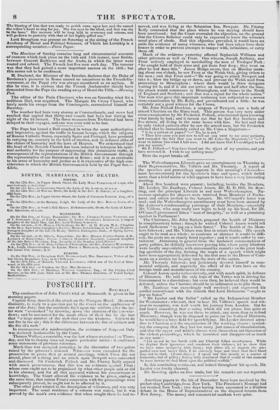POSTSCPIPT •
SATURDAY.
The continuation of John Frost's trial at Monmouth is given in the morning papers.
Captain Gray described the attack on the AVestgate Hotel. I to swore distinctly, in reply to a question put by the Court on the application of one of the Jury, that the assailants fired upon the soldiers Our the lat- ter were " unmasked " by throwing down the shutters of the inn-win- dows; and he accounted for the small effect of their fire by the fact that "a large number of the mob shot ore,' the windows. Soldiers do not fire in tile air ; this is the dillereuce between the lire of soldiers and the fire of a mob."
In consequence of a misdescriplion, the evidence of Sergeant Daly was declared inadmissible by the Court.
Thomas 'Walker, a constable, was the last witness °samba-1 on Thurs- day, and his te,timony does not require particular notice : it confirmed some statements of ltreviotts W itiuCses.
Much time was occupied yesterday in the discussion of two points taised by the prisoner's counsel. Witnesses were examined for the prosecution to prove that at several meetings, which Frost did not attend, plans of a rising and an attack upon Newport were concocted and discussed. Sir Frederick Pollock and Mr. Fitzroy Kelly argued with much perseverance, that this was no evidence agaiust Frost ; whose case ought not to be prejudiced by what other people said or did in his absence, and for all that appeared without his concurrence or knowledge. The Court allowed the evidence to be given, stating at the same time, that unless Frost's connexion with the proceediugs were subsequently proved, he ought not to be affected by it. The other point related to the description of witnesses, and was very important. The usual residence of a witness was stated, but it was proved by the man's own evidence that when sought there Jte had re-
moved, and was living at the Salutation Inn, Newport. Mr. Fitzroy Kelly contended that the place where he was staying should have been mentioned : but the Court overruled the objection, on the ground that the Crown Solicitor could only be expected to know the witness's usual place of abode. Had this objection prevailed, it would have set aside the evidence of many witnesses, who had been taken from their homes in order to prevent attempts to tamper with, intimidate, or carry them off.
Much of the evidence yesterday affected Zephaniah Williams and other prisoners as well as Frost. One witness, Joseph Anthony, saw Frost actively employed in marshalling the men at Tredegar Park : " he caught hold of their arms and put them four deep ; they went on after he had done this." James Hodge swore, that on Monday morn- ing about one o'clock, he saw Frost at the Welsh Oak, giving orders to the men ; and that Frost said—" He was going to attack Newport and take it ; blow the bridge up or down, and prevent the 'Welsh mail front proceeding to Birmingham ; where there would be three delegates waiting for it, and if it did not arrive an hour and half after the time, the attack would continence in Birmingham, and thence to the North of England and Scotland ; and that was a signal for the whole nation." The man who gave this important testimony was subjected to a severe cross-examination by Mr. Kelly, and prevaricated not a little : he was certainly not a good witness for the Crown.
Mr. John Nichol} Hawkins, a surgeon of Newport, saw a body of armed Chartists on the Risen road. 'Phis person was very testy under cross-examination by Sir Frederick Pollock, Who insisted upon knowing what family he had; and it turned out that he had five brothers and five sisters, all living in the same house with him. He had said that Ito only visited patients after he saw the armed men, but Sir Frederick elicited that he immediately called on Mr. Coles a Magistrate—
ha be a patient of' yours?"—' No, lie is liot."
" Then how came you just now to tell me you went to see some patients, and concealed the fact that you went to Mr. Coles the Magistrate's "—" went to inform hint what 1 had seen. 1 did not know that 1 was obliged to tell you my secrets." Sir F. Pollock—" You have found out the object of my question, and you. have answered it. I with to say nothing more."
Here the report breaks oft
































 Previous page
Previous page